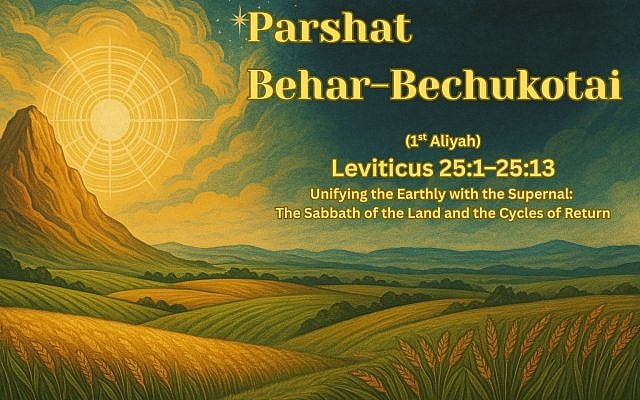Bonjour / Hello [nickname_else_first_name]
Table of contents
1) Perashat Hashavoua - Rabbi Eli Mansour
2) Halakhat Hashavoua (Halakhot related to day to day life) By Hazzan David Azerad -
The History of the Sanctification of the Moon- Peninei Halacha
3) Holy Jokes!
4) For KIDS

This Week's Parasha Insight with Rabbi Eli Mansour
Parashat Behar-Behukotai: Freedom and Family
The Torah in Parashat Behar presents the laws that apply on the Yobel, or the "jubilee" year which was observed every fifty years during the times of the Bet Ha’mikdash. One of the laws of the Yobel is that all servants would be released. In those times, men who fell into poverty had the option of selling themselves as servants as a means of sustenance. The Torah commands that servants may not be held indefinitely, and on the Yobel all servants must be released.
Interestingly, when the Torah formulates this command, it emphasizes that with the onset of the jubilee, the servant returns to his family ("Ve’ish El Mishpahto Tashubu" – 25:10). Rather than simply state that the servant is set free, the Torah found it necessary to note that the servant returns to his family.
Contemporary society, to a large extent, views family as a burden that undermines a person’s freedom. To be free, we are trained to think, means being free from responsibilities and obligations, and family life imposes many responsibilities and obligations. The Torah has a fundamentally different understanding of the concept of freedom, teaching that the ultimate freedom is the ability to act the way we are supposed to act – which includes caring for one’s spouse, children, parents, siblings and relatives. We are not to see family as a difficult burden which we begrudgingly bear. We should embrace the challenges and obligations associated with family life, and view them as one of our greatest privileges and among the greatest sources of joy and satisfaction that we can have.
And thus the jubilee, the year of "freedom," is described as a time for families to reunite. The servant does not just go anywhere on the Yobel; he must go back to his family, where he belongs. Family life does not undermine freedom; it is one of the greatest expressions of freedom, and thus the freedom granted by Yobel demands a return to family.

Halachot this week are selected and Translated by Hazzan David Azerad
The History of the Sanctification of the Moon- Peninei Halacha
As a result of Roman persecution, the Jewish settlement in the Holy Land dwindled during the Talmudic period, while the larger community of Jews became ensconced in Babylonia and advanced in all areas. Nonetheless, the Sages of Eretz Yisrael retained the authority to sanctify months and intercalate years, as it says, “For out of Zion will go forth the Torah”(Yeshayahu, 2:3), and they dispatched messengers every month to inform the Jews residing in the Diaspora when the new month began. Only on rare occasions, like during the Beitar revolt, when the situation in the Holy Land was unbearable, and the Sages could not sanctify the months, judges ordained in Eretz Yisrael would leave the Land and journey to a place where the anti-Jewish decrees did not reach, to calculate the the months and the years.
Eventually, the Roman decrees intensified. As a result of Christian influence, decrees were aimed at the Sages in an attempt to stop them from sanctifying the months. During this period, the Rabbis of Eretz Yisrael sometimes had to sanctify a month while they were in hiding, and then inform the Sages of Babylonia by way of a secret letter (see Sanhedrin 12a).
Towards the end of the Talmudic period, Hillel the Second realized that the rabbinic courts of Eretz Yisrael would no longer be able to sanctify the months. He feared that hardships and evil decrees would lead to the termination of the institution of semichah. As Nasi, Hillel had the authority to fix the calendar, for he had inherited the presidency of the high court in a generational chain from Rabbi Yehudah HaNasi. Therefore, he and his fellow judges took the initiative and calculated the months and years forever, consecrated them in advance. Thus, in the year 4119 from creation (359 CE), the Jewish people began to count the months according to the Jewish calendar that Rabbi Hillel HaNasi established. We pray that we will soon be privileged to witness the final redemption, when the Beit Din in Jerusalem will once again sanctify the months.
The Rambam explains a very important concept, teaching that the sanctification of the months depends on the inhabitants of Eretz Yisrael, even after semichah was abolished. When the Jews of the Holy Land calculate the order of the months based on the fixed formula that Hillel used to establish the calendar, then the months are sanctified. If, however, no Jews lived in Eretz Yisrael, God forbid, the order of the months, along with all the holidays, would cease to exist. The Rambam adds, “God forbid that He should do such a thing, for He has promised us that the remnants of our nation will never be destroyed.
Bevirkat Shabbat Shalom Umevorach
David Azerad
3) HOLY JoKeS!!
Selection of funny snippets, loosely related to this weeks parashah or current events, to brighten your day



4) FOR KIDS
Click on the image to open the youtube video



















